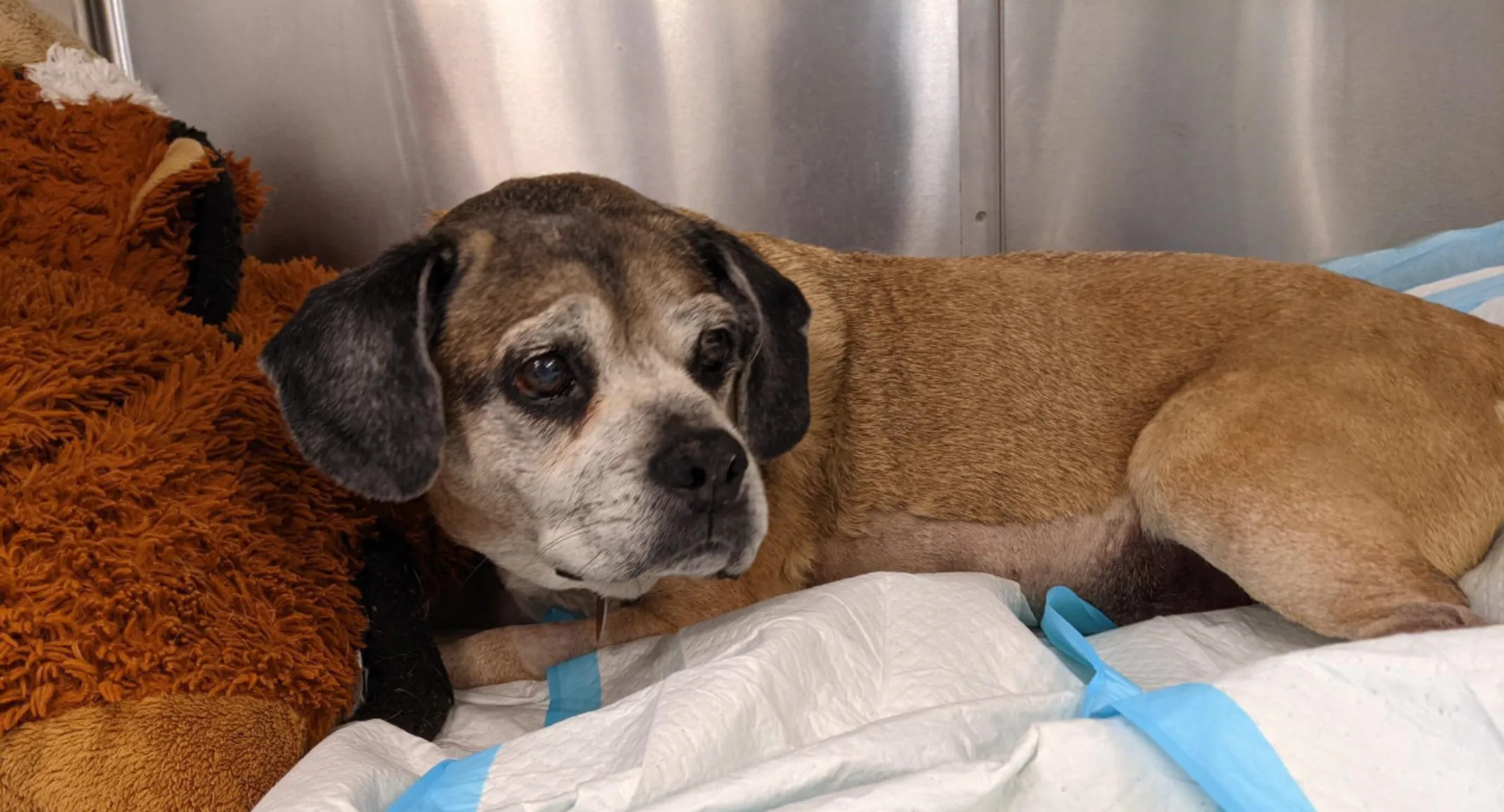Patient Success Story: Chip
General

At Virginia Veterinary Centers, we offer compassionate care at each of our three locations, no matter what challenges your pet is facing. In some cases, a patient’s condition may require the attention of multiple disciplines of medicine. Fortunately, at VVC our board-certified specialists, emergency doctors, and a team of support staff can collaborate on cases to ensure that our patients receive the best care available. We recently saw a perfect example of comprehensive care and team collaboration at our Fredericksburg hospital. Continue reading to learn more about the story of Chip, a 13-year-old Pug who visited our hospital recently.
EMERGENCY PRESENTATION
Chip, also known affectionately to his friends as “Chippy”, is one tough cookie. He has previously survived the surgical removal of two cancers, melanoma in his mouth and the removal of one of his adrenal glands. He currently still sees Dr. Jankowski and Dr. Dong at our Richmond hospital to manage these conditions long-term. Chip, unfortunately, became sick recently and presented to Virginia Veterinary Centers in Fredericksburg for sudden vomiting and not eating. On presentation, Chip was essentially comatose. His blood pressure and blood sugar were incredibly low so Dr. Parsley and the overnight ER staff quickly started aggressive resuscitation. In addition to IV fluids and sugar supplementation, Chip also required a medication called norepinephrine to control his blood pressure. Norepinephrine is a neurotransmitter that is naturally made in the body and is part of your “fight or flight” response to stress. It is used to increase your heart rate and adjust the diameter of your blood vessels to increase your blood pressure. If you required supplemented norepinephrine, you are indeed very sick!
INTERNAL MEDICINE CONSULT
By the next morning, Chip’s blood sugar and blood pressure were stabilized however he was still in a coma. For further management and support, he was transferred to Dr. Donahue in the Critical Care department. An abdominal ultrasound by our board-certified Internal Medicine specialist, Dr. Austin, showed a gallbladder mucocele. The gallbladder is a balloon-looking organ that sits tucked away in your liver and collects bile from the liver. This bile helps to digest fats as it empties into the small intestine. A mucocele occurs when the gallbladder becomes distended with mucous and obstructs the outflow tract. If not addressed quickly, this can lead to rupturing of the gallbladder, a result that can often cause quick decline and be fatal.
SURGERY
Chip’s family said he’s been through so much but was still a very happy and active dog who had so much more life in him. Despite an unfortunately poor prognosis, his family elected to give him every chance they could and sent him into surgery. Our board-certified surgeon, Dr. Au, removed his gallbladder and biopsied his liver. During surgery, Chip required both a continuation of his norepinephrine and a plasma transfusion. Plasma is the part of your blood that contains proteins and a plasma transfusion is plasma that has been donated from another dog. In Chip’s case, he required the plasma transfusion due to concerns with not being able to make blood clots appropriately as well as an additional way to manage his blood pressure. Dr. Donahue and our anesthesia technicians carefully monitored Chip’s vitals during surgery and he survived anesthesia.
Right after surgery, we found that Chip’s cortisol levels were very low. This is likely due to him previously having an adrenalectomy (adrenal gland removal), leaving him with only one adrenal gland. Adrenal glands are small, triangle-shaped glands that sit above the kidneys. They are called “adrenal glands” because one of their functions is to release adrenaline, a.k.a. epinephrine. Adrenal glands also release a hormone called cortisol. If your cortisol levels are low you are not able to respond to stress very well. Oftentimes, we see low cortisol levels in dogs who have a disease called Addison’s Disease, which is a life-long (but treatable!) disease. Sometimes, in very sick patients like Chip, they develop a transient disease called Relative Adrenal Insufficiency (RAI) or Critical Illness Related Corticosteroid Insufficiency (CIRCI). Fortunately, the treatment can be fairly simple…steroids! Chip was started on injectable steroids and his norepinephrine and sugar supplementation were then able to be decreased and subsequently discontinued.
POST-OP SUPPORT
After surgery, Chip was unfortunately still in a comatose state. In discussing with his family that his numbers are improving, we had to address the hard truth that Chip might not ever wake up. His condition could be due to brain damage sustained from how low his blood sugar and blood pressure were initially. Since Chip was otherwise improving, his care was continued in the hopes that he just needed more time. Chip was getting IV fluids, antibiotics, heparin to prevent unwanted blood clots to his brain/lungs/limbs, food through a feeding tube, and a urinary catheter to keep him clean. Additionally, with the help of Sam Blake, our Certified Canine Rehabilitation Practitioner (CCRP) from our Physical Rehabilitation department, Chip was being treated to keep his limbs and joints healthy and prevent pressure sores while he was immobile.
RECOVERY
Quite suddenly, Chip woke up! While he was still unable to get up and move around on his own and had pretty bad tremors, he was awake and hungry! (When discussing his feeding tube placement, Chip’s family actually stated that “If Chip is awake, he’ll be hungry”). We continued rehabilitation with him to encourage muscle strength and coordination. Chip continued to eat and take his medications and his blood values improved significantly. He proved his family correct that he still had a lot of life left in him. Then, during one overnight shift, he got up on his own and walked out of his cage to explore the ICU. He was still weak and had tremors, but this was a shocking change and had the overnight staff floored.
Chip was discharged a few days later with continued rehabilitation instructions for his family at home. He has been following up with his long-term team in Richmond and is doing great! His family reports that you wouldn’t even know he was ever sick. Sometimes it takes a village, or in this case, an entire hospital to treat our patients. The staff at Virginia Veterinary Centers in Fredericksburg were happy to have been able to provide this care to Chip and his family.
Click to view our video that highlights some of Chip’s progress towards recovery at VVC.
